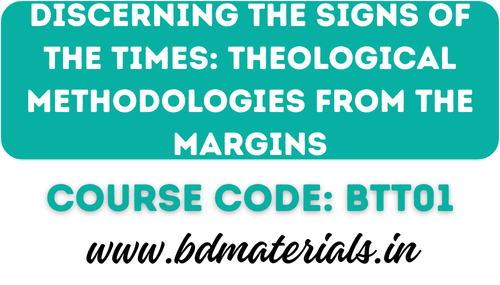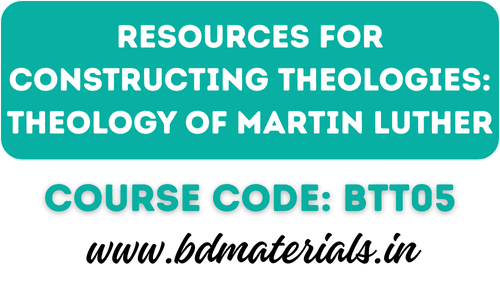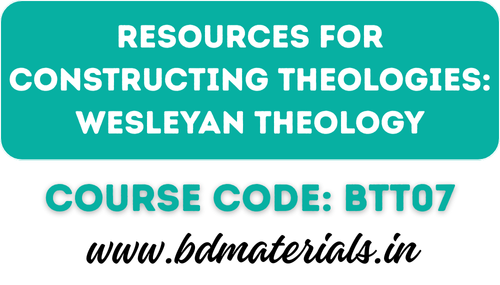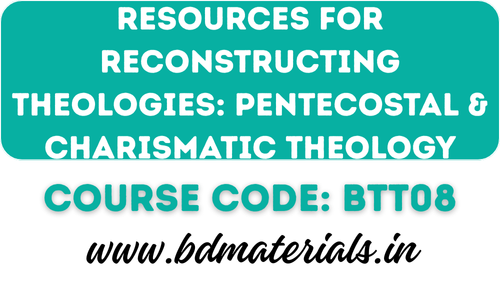Course Code: BTT01
Discerning the Signs of the Times: Theological Methodologies from the Margins
BD I, Semester 1, 4 Credit Hours, College Paper
Course Objectives
- To enable the students to understand our particular social context as the locus for theological and ethical reflections and praxis. Understanding our social context is an invitation to discern the signs of the times. Discerning the Signs of the Times enables us to immerse in the everyday life experiences of our communities, and to reflect upon the nature, content, priorities, perspectives, and politics of our theological and ethical discourses and praxis.
- To help the students to understand the wider power structures and social relations such as global capitalism, casteism, patriarchy, homophobia, and the like that affect the integrity, dignity, and sacredness of the life of God’s creation through local engagements with the life stories of the communities.
- To help the students to problematize the dominant theological methodologies by way of deconstructing them, exposing the fallibility of the objective knowledge, and rejecting the hegemony of meta-narratives.
- To enable students to learn the method of developing a perspective from their experience and contexts and engage with the wider theological initiative.
Pedagogical Methods
Being a context-tailored course, this course needs to be re-designed according to the particular context of each theological college/seminary. The learning community—which includes the instructor as well—will visit different locations to experience and understand how death and destruction haunt the lives of the marginalized communities. Interactions with community leaders, activists of local social movements, and their publications will help to problematize the problem differently. The class sessions provide opportunities for the students to present their reflections on the immersion experience and to discern the problem with clarity. The class sessions will also enable the students to develop new perspectives of doing theology and engaging in ministry in solidarity with the subalterns and their movements.
Course Requirements
- Final Examinations: 60%
- Internal Assessment: 40%
Course Outline
UNIT I: Faith Seeking Understanding and Discernment
- Introduction to Theological Methodologies: Systematic, Contextual, Subaltern, Eastern and Postmodern Theologies.
- Discerning the Signs of the Times: The First Act in Doing Theology.
UNIT II: Idolatry of Wealth and Commodification of Life
- Globalization, Development and Modern Science and Technology.
- Colonization of jal, jungle and jamin.
UNIT III: Patriarchy and Hegemony
- Exclusion of Women.
- Violence Against Children.
UNIT IV: Caste System: The Original Sin of India
- Theories and Practices of Exclusion.
- Affirming Identity.
UNIT V: Religious Fundamentalism and State Terrorism
- Religious Fundamentalism.
- Terrorism and State Terrorism.
UNIT VI: Theology From the Margins
- Re-imagining Epistemology from the Margins.
- Methodological Perspective from the Margins.
UNIT VII: Sources of Theology
- Re-imagining Sources from the Margins: Scripture(s) and Hermeneutics.
- Re-imagining Sources from the Margins: Tradition(s).
- Re-imagining Sources from the Margins: Experience(s).
UNIT VIII: Praxiological Mediation
- Enabling Subaltern Agency and Subjectivity.
- Public Witnessing in Pluralistic Communities.
UNIT IX: Re-imagining Ekklesia
- Ekklesia as Community of Communities.
UNIT X: Vocation of a Christian Minister
Bibliography
Basic Books
- Abraham, K.C. Transforming Vision: Theological-Methodological Paradigm Shifts. Tiruvalla: CSS, 2006.
- Dietrich, Gabriele. A New Thing on Earth. Delhi: ISPCK, 2001.
- Jones, Serene and Paul Lakeland, eds. Constructive Theology: A Contemporary Approach to Classical Themes. Minneapolis: Fortress Press, 2006.
- Longchar, Wati. Emerging Asian Theology: Issue, Method, and Perspective. Jorhat: Tribal Study Centre, ETC, 2001.
- Migliore, Daniel L. Faith Seeking Understanding: An Introduction to Christian Theology. Grand Rapids: William B. Eerdmans, 1991.
- Wilfred, Felix. Margins-Site of Asian Theologies. Delhi: ISPCK, 2008.
Supplementary Readings
- Abraham, K.C. and M.P. Joseph. “Politics of the Reign of God: Missiology of Social Action Groups in India.” In The People of God Among All God’s People: Frontiers in Christian Mission. Edited by Philip E. Wickeri. Hongkong: CCA, 2000.
- Alvares, Claude. Science, Development and Violence: The Revolt against Modernity. Delhi: Oxford University Press, 1994.
- Bevans, S.B. Models of Contextual Theology. New York: Orbis Books, 1994.
- Bevans, Stephen. Models of Contextual Theology. Maryknoll: Orbis Books, 1985.
- Bhasin, Kamala. What is Patriarchy? Delhi: Kali for Women, 1993.
- Boff, Clodovis and Leonardo Boff. Liberation Theology. San Francisco: Harper and Row, 1986.
- Boyd, Robin. An Introduction to Indian Christian Theology. Delhi: ISPCK, 1975.
- Brown, Robert McAfee. Theology in a New Key. Delhi: Lithouse Publications, 1983.
- Chacko, Laji. “Discerning the Signs of the Times,” Kolkata: SCEPTRE, 2014.
- Clarke, Sathianathan. Dalits and Christianity: Subaltern Religion and Liberation Theology in India. Delhi: Oxford University Press, 1998.
- Cone, James H. A Black Theology of Liberation. Maryknoll: Orbis Books, 1986.
- Duchrow, Ulrich, et al. Property for People, Not for Profit: Alternatives to the Global Tyranny of Capital. Geneva: WCC Publications, 2004.
- Duchrow, Ulrich. Alternatives to Global Capitalism: Drawn from Biblical History, Designed for Political Action. Utrecht: International Books, 1995.
- Fulkerson, Mary McClintock. Changing the Subject: Women’s Discourse and Feminist Theology. Eugene: Wipf and Stock Publishers, 2001.
- Gnanadason, Aruna. No Longer a Secret: The Church and Violence against Women. Geneva: WCC.
- Gutierrez, Gustavo. Theology of Liberation: History, Politics, and Salvation. Maryknoll: Orbis.
- Haraway, Donna. “Situated Knowledges: The Science Question in Feminism and the Privilege of Partial Perspective.” Feminist Studies 14/3 (1988): 575-99.
- Ilaiah, Kancha. “Dalitism Vs. Brahmanism: The Epistemological Conflict in History.” In Dalit Identity and Politics. Edited by Ghanshaym Shah. New Delhi: Sage Publications, 2001.
- Kasuke Koyama. Waterbuffalo Theology. New York: Orbis Books, 1989.
- Kittredge, Cynthia Briggs, et al., eds., Reading the Signs of the Times: Taking the Bible into the Public Square. Minneapolis: Fortress Press, 2008.
- Longchar, Wati, ed. Glocal in Market Place. Jorhat: ETE-WCC, 2004.
- Macquarrie, John. Principles of Christian Theology. New York: Scribner, 1966.</li
- Maryknoll. New York: Orbis Books, 1996.
- Massey, James. Roots: A Concise History of Dalits. Delhi: ISPCK, 1991.
- Nehring, Andreas, ed. Prejudice: Issues in Third World Theologies. Chennai: Gurukul, 1996.
- Omvedt, Gail. Dalit Visions: The Anti-Caste Movement and the Construction of an Indian Identity. New Delhi: Orient Longman, 2006.
- Razu, John Mohan. Global Capitalism as Hydra: A New Look at Market, Money and MNCs Ethical Dilemmas between the Idols of Death and God of Life. Delhi: ISPCK/BUILD, 2006.
- Roy, Arundhati. Listening to the Grasshoppers: Field Notes on Democracy. New Delhi: Penguin Press, 2008.
- Rufus, Peniel Rajkumar. Dalit Theology and Dalit Liberation: Problems, Paradigms, and Possibilities. London: Ashgate, 2010.
- Sebastian, Mrinalini. “Implications of Postcolonial Thinking for Feminist Praxis in India.” In Feminist Theology: Perspectives and Praxis. Edited by Prasanna Kumari. Chennai: GLTS, 1999.
- Shimray, S. “Relationship Between Theology and Social Analysis: A Methodological Implication for Doing Tribal Theology” in Journal of Tribal Studies Vol. XV. No. 1. January-June 2010.
- Shiva, Vandana. Globalization’s New Wars: Seeds, Water and Life Forms. New Delhi: Women Unlimited Press, 2005.
- Shiva, Vandana. The Violence of Green Revolution: Third World Agriculture, Ecology and Politics. Penang: Third World Network, 1991.
- Solberg, Mary M. Compelling Knowledge: A Feminist Proposal for an Epistemology of the Cross. New York: State University of New York Press, 1997.
- Stephen, M. Introducing Postmodernism and Postcolonialism. New Delhi: Concept Publishing Co., 2013.
- Sugirtharajah, R.S. and Cecil Hargreaves, eds. Readings in Indian Christian Theology. London: SPCK, 1993.
- Teltumbde, Anand. Khairlanji: A Strange and Bitter Crop. New Delhi: Navayana, 2008.
- Thomas, M.M. Response to Tyranny. Tiruvalla: CSS Books, 1999.
- Thomas, M.M. The Church’s Mission and Post-Modern Humanism. Tiruvalla: CSS, 1996.
- University Press, 1994.
- Vinayaraj, Y.T. Re-imagining Dalit Theology: Post-Modern Readings. Tiruvalla: CSS, 2008.
- Vinayaraj, Y.T. Re-visiting the Other: Discourses on Postmodern Theology. Tiruvalla: CSS, 2008.
- Intercessions: Theology, Liturgy, and Politics. Delhi: ISPCK, 2015.
- “Social Theories for Theological Research” in Intercessions: Theology, Liturgy, and Politics. Delhi: ISPCK, 2015, 120.
- Weaver, Jace, ed. Defending Mother Earth: Native American Perspectives on Environmental Justice.
- Wielenga, Bastiaan. Towards an Eco-Just Society. Bangalore: CSA, 1999.
- Yong-Bok, Kim. Messiah and Minjung: Christ’s Solidarity with the People for New Life. Kowloon, Hong Kong: CCA/URM, 1992.
- Zachariah, George. Alternatives Unincorporated: Earth Ethics from the Grassroots. London: Equinox, 2010.
Friendly Note
Bachelor of Divinity Materials is your one-stop resource for comprehensive Biblical studies, designed to support students pursuing a Bachelor of Divinity (B.D.) and other theological courses. Our website is a dedicated platform that provides access to the full syllabus of the Bachelor of Divinity course along with detailed answers, ensuring a thorough understanding of every subject and topic covered in your curriculum.
Here, you will find a vast collection of assignments, study guides, articles, and research papers meticulously curated to assist you in excelling academically. The platform also features a rich selection of theological books, journals, and resources spanning diverse subjects such as Old Testament, New Testament, Systematic Theology, Church History, Biblical Languages, and Pastoral Studies.
To make your learning experience convenient and accessible, we offer downloadable PDFs of study materials, including books and journals, allowing you to learn anytime, anywhere. Whether you are preparing for exams, writing assignments, or conducting in-depth research, these resources are tailored to meet the needs of both students and scholars in biblical and theological studies.
With a commitment to empowering theological learners, our mission is to provide high-quality, authentic, and practical study materials. Explore Bachelor of Divinity Materials to grow spiritually, academically, and intellectually as you deepen your understanding of God’s Word and Christian doctrine. This platform is a valuable resource for aspiring ministers, pastors, and anyone dedicated to the study of theology and biblical teachings.






